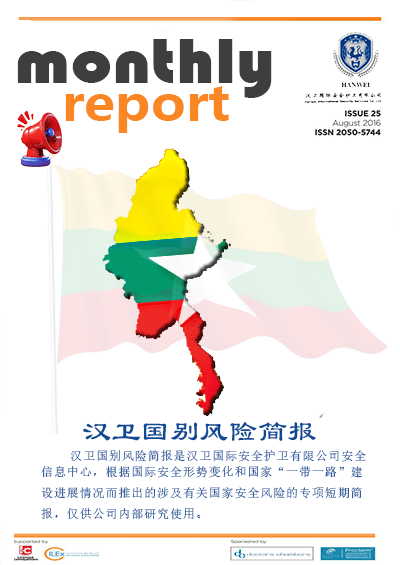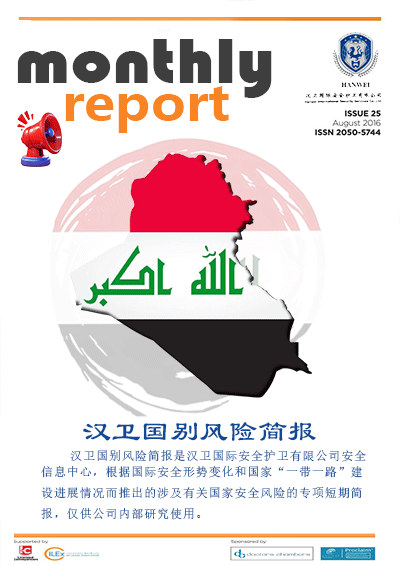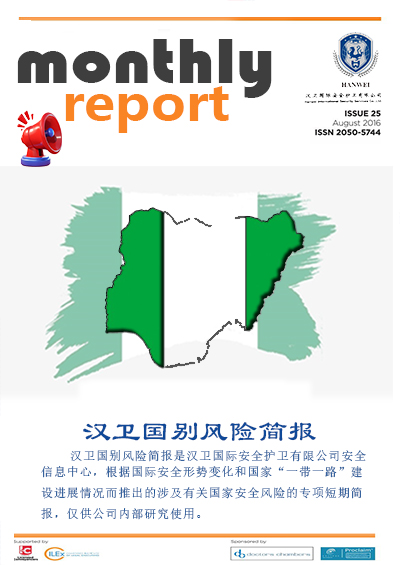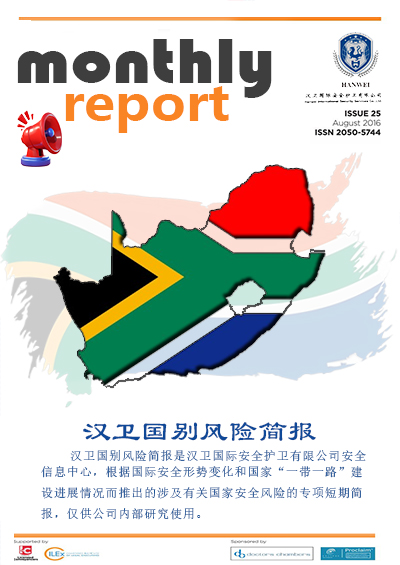Overview of Iraq's Security Situation in June
Researcher No. 006
According to the monitoring report of the security officer of Hanwei International stationed in Iraq and related media reports, Iraq is facing a complex situation this month in terms of major security conflicts, political economy and external threats. In terms of major security conflicts, the Iran-Israel conflict has led to attacks on military facilities within Iraq and the appearance of drone and missile debris, deteriorating the security situation. Politically and economically, the government has postponed the submission of the detailed budget list, and there are numerous employment and salary crises in the reservoir area, which may trigger a crisis concerning people's livelihood. In terms of external threats, Turkey has been continuously cracking down on the Kurdistan Workers' Party, while the remnants of ISIS are struggling to survive. Additionally, frequent shootings have occurred in many places, causing severe disruption to social stability.
Recently, the Institute for Economics and Peace (IEP) released the "Global Peace Index 2025", which assesses the current peace situation of 163 participating countries based on three major dimensions: social security and public order, the degree of domestic and international conflicts, and the level of militarization. Among them, Iraq ranks 147th and 19th among Arab countries. It is worth noting that Iraq's ranking among Arab countries has been continuously declining, dropping from 16th place in 2022 to 17th place in 2023-2024, and further falling to 19th place in 2025, further highlighting the deteriorating domestic security situation in Iraq.
The first aspect is major security conflicts.
(1) Iraq's Security Dilemma under the Iran-Israel Conflict
At 1:00 a.m. on June 13, 2025, Israel launched a military operation named "Rising Lion", launching large-scale air strikes on nuclear facilities in multiple Iranian cities, resulting in the deaths of many Iranian military leaders, senior generals and nuclear experts, as well as over 100 civilians. This operation triggered a strong counterattack from Iran, thus kicking off a 12-day melee between the two sides. Among them, the "Midnight Hammer" air strike launched by the United States on Iran's nuclear facilities further exacerbated the deterioration of the situation. On June 24th, under the mediation of the international community, Iran and Israel reached a ceasefire agreement. On June 27th, Iran launched the "Revenge of Martyrs" operation against Israel. On July 1st, the Houthi armed group in Yemen launched the "Holy Defense" operation against Israel. On July 3rd, Israel launched a "decapitation air strike" against Iran. On July 5th, Iran issued a warning to Israel that if it launched another attack, it would no longer hold the "red line". It can be seen from this that since the ceasefire agreement was reached and the rhetoric between the two sides has been intense, the root cause of the conflict between Iran and Israel - the Iranian nuclear issue - has not been resolved, and there is no strong ceasefire supervision mechanism. Therefore, the possibility of a recurrence of war between the two countries is relatively high.
The Iran-Israel conflict has posed significant security risks to Iraq. ① Airspace security is under threat: Israeli forces have repeatedly used Iraqi airspace to strike Iranian targets. Due to the lack of advanced air defense systems, Iraq has found it difficult to carry out effective interceptions, making airspace security the weakest link in the national security framework. On June 25th, it was reported that drone and missile debris were found in multiple locations in southern Iraq. ② The risk of military facilities being attacked has risen: Camp Cook near Baghdad in Iraq and Imam Ali Air Base in the south were hit by drones. Although there were no major casualties, the military facilities were severely damaged. ③ The risk of direct military confrontation is on the rise: There are numerous pro-Iranian armed groups in Iraq, including the Hezbollah Brigade. These groups have a strong religious color, close ties with Iran, and significant political influence. Against the backdrop of the Iran-Israel conflict, the hatred of pro-Iranian armed groups towards Israel and the United States has deepened. They may launch domestic and cross-border attacks on US military bases in Iraq and Israel, triggering retaliation from the US and Israel and drawing Iraq into direct military confrontation. Meanwhile, there are continuous conflicts among different political factions, religions and ethnic forces within Iraq. Against this backdrop, it is easy to be exploited by external forces, further affecting the already unstable domestic situation and even triggering internal conflicts. ④ The slowdown of economic development triggers public dissatisfaction: If the Iran-Israel conflict persists for a long time, it will not only lead to fluctuations in national oil prices and a sharp decline in Iraq's domestic fiscal revenue, but also affect the overall business environment. Economic development will slow down or even come to a standstill, threatening the survival of the people and easily triggering riots, further threatening national security.
The second aspect is political and economic.
(1) The Iraqi government is being sued for budget delays, which may trigger a crisis in people's livelihood
On June 23rd, members of the Iraqi parliament disclosed that the Iraqi government was sued by the parliament for failing to submit the detailed budget for 2025. It was accused of violating relevant provisions of the Iraqi Constitution, the 2019 Fiscal Management Act, and the 2023 Budget Law, which seriously affected social welfare, salary payments, and the overall obstruction of public services. Although a member of the parliament's finance committee stated that the budget is expected to be delivered in July, it has already triggered multiple social risks.
① Political legitimacy crisis: The Iraqi government failed to submit the budget details on time as required by the Constitution and laws, resulting in a lack of legal basis for fiscal expenditures. Moreover, due to disputes over issues such as the distribution of oil revenues and the transparency of fiscal revenue and expenditure, different political factions, religions and ethnic groups within Iran may take advantage of this to "make a big fuss" and shake the foundation of the ruling party. ② The paralysis of public services and the sharp increase in public dissatisfaction: The delay in submitting the budget details has led to the stagnation of public spending, directly affecting the resettlement of millions of displaced people, the salary payment of public officials, and the suspension of public services such as basic medical care and education enjoyed by the entire nation. This is highly likely to trigger large-scale public gatherings and impact government institutions. ③ Risk of terrorist infiltration: At a time when the situation in the Middle East is highly volatile, the remnants of ISIS may recruit oppressed poor youth under the pretext of "relief supplies" and launch more small-scale attacks in Salahuddin Province.
(2) Iran is facing a dual crisis of wages and employment
The salary crisis in the reservoir area has triggered a chain reaction. On the eve of Eid al-Adha on June 6th, the Iraqi federal government halted the disbursement of funds to the Kurdistan region on the grounds that the region had not fully remitted its fiscal revenue, directly resulting in the suspension of over a million civil servants' salaries in the reservoir area. The Kurdish side emphasized that the issue of salary should not be reduced to a political tool. Large-scale protests broke out in Sulaimaniyah and other places due to dissatisfaction with wage arrears. Security forces used force to arrest many journalists, teachers and public officials who participated in the protests. Teachers in Kirkuk continued to protest in support. Protests and arrests have formed a serious vicious cycle, constantly intensifying the conflict between the people and the federal government, causing public dissatisfaction to rise continuously and further exacerbating the division between the central and local governments.
The employment protest in Basra turned violent. On June 1st, hundreds of engineering and geology graduates in Basra staged a protest against the unfair employment situation in the oil industry. During the protest, they clashed with security forces, resulting in one person being injured. The protesting graduates claimed that the industry was "dominated" by party networks, workers from other provinces and foreign workers, and local talents were excluded. Basra, as a major oil-producing region, contributes over 60% of its oil revenue. However, local graduates face employment difficulties, eventually leading to a "resource curse". Public demands and government suppression may trigger broader social instability.
The third aspect is external threats.
(1) Turkey continues to crack down on the Kurdistan Workers' Party
This month, the relationship between Turkey and the PKK entered a transitional phase. Turkey claims that if the PKK earnestly implements the decision to dissolve, it will cease large-scale military operations and switch to "regular suppression". On the evening of June 17th, a witness claimed that Turkey shelled the positions of the Kurdistan Workers' Party (PKK) in the northern part of Duhok Province, causing a serious fire. On the 24th, Turkish fighter jets launched an air strike on the PKK stronghold in Medina Mountain, Amedia District in the northern part of the province. No casualties or related losses have been reported so far.
However, Turkey's recent crackdown on the PKK has seriously affected the survival and development of the local people: the shelling and air strikes in the northern part of Duhok have caused fires, leading to the displacement of the people and making it easy for a refugee wave to form. At the same time, the damage to infrastructure and the loss of people's lives and property can easily trigger public panic and dissatisfaction.However, Turkey's recent crackdown on the PKK has seriously affected the survival and development of the local people: the shelling and air strikes in the northern part of Duhok have caused fires, leading to the displacement of the people and making it easy for a refugee wave to form. At the same time, the damage to infrastructure and the loss of people's lives and property can easily trigger public panic and dissatisfaction.
(2) Iran continues to suppress the remaining forces of ISIS
At the beginning of this month, Iraqi security forces carried out a preventive clearance operation along the complex terrain of the Azim River and successfully seized several ISIS shells left behind. On the 10th, an operation was launched against the Zgaitong Valley in Kirkuk Province, which has long been occupied by ISIS. The terrorist hideouts were cleared and military fortifications were built. On the 12th, based on precise intelligence and information tracking, five ISIS terrorists were successfully captured in the town of Kiara in Nineveh Province. On the 20th, a military strike operation was carried out in the Wadi al-Shay Valley in the south of Kirkuk Province, successfully destroying multiple ISIS shelters. On the 24th, there was a fierce exchange of fire with ISIS militants in the Wadizgaitong area in the south of Kirkuk Province, and two senior ISIS leaders were successfully killed. On the 29th, three ISIS members were successfully eliminated in the Balkana Mountains on the border between Saladin Province and Kirkuk Province.
Judging from the capture and killing of ISIS personnel in various places, the organization still has a certain systematic operation, with senior leaders and low-level executive members, and possesses certain weapons and equipment. It operates in many places such as the mountainous areas of Nineveh Province and Kirkuk Province, constantly creating small-scale chaos by taking advantage of the complex terrain. In recent years, Israel has been in constant conflict with Palestine, Lebanon, Syria and Iran. The geopolitical situation around Iraq has become more complex. Some extreme terrorists may find a way to survive and collude with foreign terrorist forces, increasing the pressure on counter-terrorism within Iraq.
(3) Malignant shooting incidents have broken out in many places in Iraq
In the center of Basra, a gun fight broke out due to a family dispute, resulting in the death of one woman. Eventually, three suspects were arrested. Nasiriye City: Unidentified armed men killed a middle-aged man in his fifties in a vehicle. The motive for the crime is still under investigation. Kirkuk Province: Members of the People's Mobilization Force (PMF) shot and killed an 11-year-old child near the Fatah checkpoint. The child's father said the child was shot while celebrating with friends. In Duhok Province, tribal armed conflicts broke out between two families in the Bishrian area of Baldalash District, resulting in the deaths of two girls and injuries to their father. Erbil City: A man in the town of Ankawa was arrested by security forces for shooting into the air with an unregistered rifle after drinking alcohol and his weapon was seized. The above-mentioned typical incidents indicate that in current Iraqi society, there still exist problems such as intensified civil disputes, deepened tribal conflicts, and the loss of control over official armed forces management. The proliferation of civilian firearms has made the situation even worse, seriously threatening the lives and property of the people.
It is recommended that Chinese-funded enterprises and individuals in Iraq focus on taking precautions: First, pay close attention to safety warning information and do a good job in safety protection. It is recommended to keep a close eye on the safety warning information released by the Chinese Embassy in Iraq and local media. Try to avoid going to military facilities and sites where drones and missiles frequently crash, and reduce the frequency of going out. If you are in a conflict-related area, it is recommended to stock up on various emergency supplies such as food, medicine and drinking water in advance. Energy enterprises such as oil companies should take good security and defense measures, especially those located in sensitive areas like southern oil fields. They should closely cooperate with private security companies to provide necessary safety training and evacuation plans for employees, ensuring the stability of business operations and the safety of employees' lives. Second, keep abreast of the dynamics of protests and demonstrations in a timely manner and stay away from protest clusters and sensitive areas. This month, severe protests and demonstrations have broken out in the Kurdistan region (Sulaymaniyah and Erbil) and Basra. It is recommended that Chinese citizens keep abreast of relevant information, avoid going out unless necessary, stay away from sensitive areas such as government agencies, squares and oil companies, and strictly follow the "two-point line" commuting pattern. Chinese oil companies in Iraq should also do a good job in security protection, establish close ties with security companies, and implement 24-hour armed patrols. It is suggested that local graduates be given priority in employment and the job selection process be made public to avoid the risk of being an "employment exclusion party". Third, always remain vigilant and take good safety precautions. At present, Iraq is confronted with security risks such as "cross-border military conflicts - remnants of terrorism - deterioration of social security". Chinese citizens and enterprises in Iraq should enhance their awareness of security precautions, stay away from ISIS active areas such as the northern border of Duhok Province, Nineveh Province and the Kirkuk Mountains, as well as areas frequently bombed by Turkey When enterprises carry out projects in relevant regions, they should strengthen security infrastructure and personnel management, and must ensure the safety of personnel and facilities. Meanwhile, shooting cases have occurred frequently in Basra, Najaf and other places. It is recommended that relevant personnel avoid going out at night, stay away from crowded places, and enterprises should take good security precautions on commuting routes.




